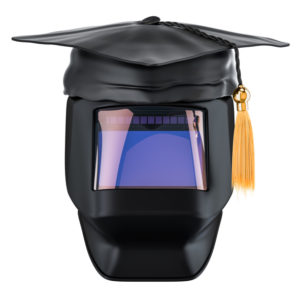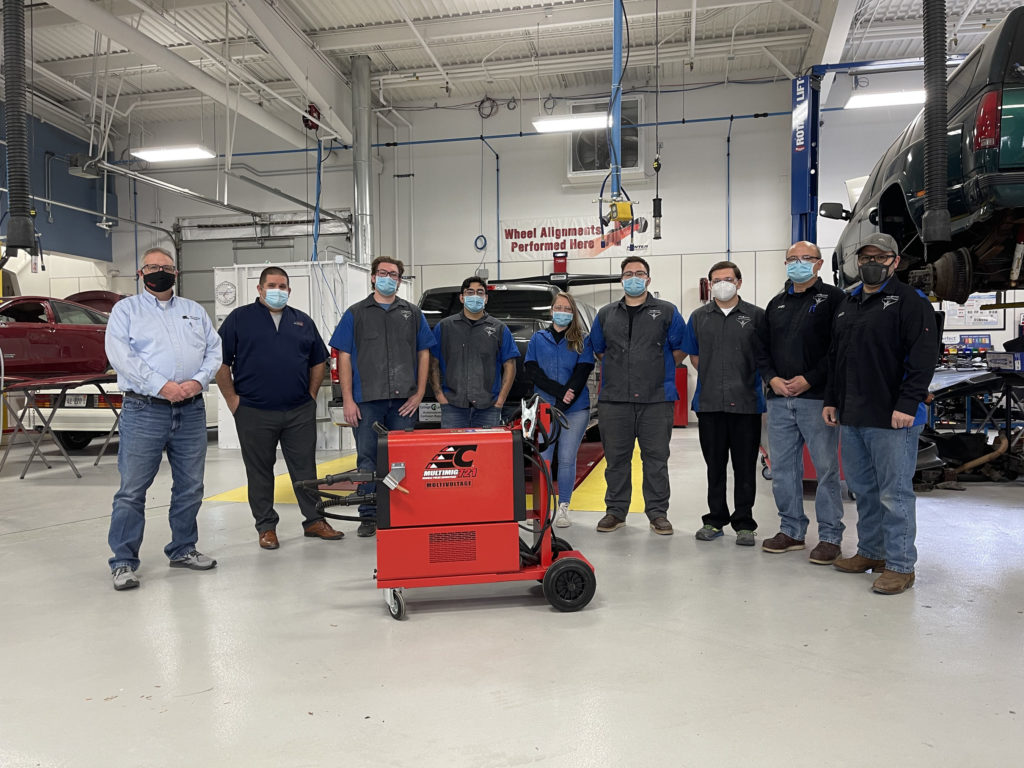
$700K grant will allow innovative collision repair training program to expand to 4 more campuses
By onAnnouncements | Education | Market Trends
A $700,000 grant from ECMC Foundation will allow a doubling in size of the Collision Engineering Program, a pilot program designed to attract and develop entry-level talent to fill key roles within the collision repair industry, and enhance retention and advancement among collision repair technicians.
Based on Ranken Technical College’s unique two-year apprenticeship model, and launched with foundational support provided by the Enterprise Holdings Foundation, the program is in the second year of a two-year pilot on four campuses across the country.
The multi-year grant from ECMC, announced by Enterprise this week, will build on that pilot program, establishing at least four more partner colleges over the next three years.
The foundation’s support will pay for startup costs to launch the program at partner colleges, allow the program to hire more staff, and provide continued support for the four existing partner colleges: Ranken Technical College in St. Louis, Mo.; College of Lake County in Grayslake, Ill.; Contra Costa College in San Pablo, Calif.; and Texas State Technical College in Waco, Texas.
ECMC Foundation, whose mission is to improve higher education and career success for students from underserved backgrounds, chose to partner with the Collision Engineering Program for a variety of reasons, said Jennifer Zeisler, the foundation’s career readiness senior program director.
“We’re excited about the innovative, five-semester associate degree Collision Engineering Program at Ranken Technical College which employs an eight-week rotation between on-campus coursework and paid work-based learning,” Zeisler said in a statement.
“We’re proud to support a program that seeks to address the need for a skilled and diverse collision technician workforce and believe this unique institution-led, earn-and-learn model will serve as a valuable blueprint for institutions looking to implement work-based learning programs.”
In an interview with RDN, Zeisler said it’s unusual for ECMC Foundation to provide this size of a grant to a single entity. She said the idea that the lessons learned would be shared with other institutions is a plus, as is the fact that participating students would be getting paid while working toward an industry credential.
The Collision Engineering Program serves both of the foundation’s focus areas: college success and career readiness. “They’ve really put together a robust program,” she said.
Based in Los Angeles, ECMC Foundation is one of several affiliates under the ECMC Group enterprise based in Minneapolis, which together work to help students succeed.
Under the Ranken apprenticeship system, a student spends eight weeks at the school and then the next eight weeks in a commercial body shop, and continues to alternate in this manner for what has historically been a four- or five-semester program. Students work alongside industry experts while earning their associate degrees.
The program is designed to address a projected shortage of collision technicians, and a developing skills gap. According to the WorkForce Foundation, nearly 100,000 new collision technicians will be needed between 2021 and 2025, as baby boomers retire and demand outpaces a declining supply of postsecondary collision technician entrants.
The initiative has support from some of the biggest names in the collision universe. According to the Enterprise Holdings Foundation, the advisory board includes American Family, Caliber, Chief, Ford, GEICO, Gerber, the Hermanek Group, I-CAR, Professional Parts Group, Progressive, Repairify, the Society of Collision Repair Specialists (SCRS) and Service King.
Industry support
Enterprise credited two companies, Chief Collision Technologies and Mitchell, for stepping up with significant donations to the program since its launch.
Chief, a major provider of collision repair products and services, is providing a MultiMig aluminum welder — valued at $12,000 — to the College of Lake County. The machine, used widely across the repair industry, will provide students with in-depth knowledge and experience working with real-world equipment.
Mitchell is offering its full suite of repair solutions to each of the four participating schools. The in-kind donation — valued at $150,000 — includes Mitchell Cloud Estimating with Integrated Repair Procedures, Mitchell TechAdvisor and its OEM-licensed repair data, and the Mitchell Diagnostics platform for scanning and calibration. These solutions are designed to help technicians efficiently diagnose, estimate and repair collision-damaged vehicles. The donation helps ensure that graduates entering the workforce will be well-equipped to properly and safely repair today’s complex automobiles.
“It’s so encouraging to see how the industry is collaborating to make a meaningful impact on the future of the automotive repair workforce and industry,” Mary Mahoney, vice president, Replacement and Leisure Division at Enterprise Holdings. “We hope others will continue to step forward and join us in this endeavor.”
More information
ECMC Foundation homepage
Enterprise, Ranken Launch Innovative Automotive Collision Engineering Program
TechForce releases the 2021 Technician Supply & Demand Report
https://techforce.org/techforce-releases-the-2021-technician-supply-demand-report/
Collision repair training pilot program benefitting from marketing fund
UPDATE: Enterprise pilot to grow collision techs using Ranken format mixing school, shop time
Collision repair trade school initiatives include shop time, free tools, ALLDATA
Images
Featured image: A $700,000 grant will help prepare more college students for key roles in the collision repair industry. (AlexLMX/iStockphoto)
Chief Collision Technology donated a welding machine to the College of Lake County in Grayslake, Illinois. (Provided by the Collision Engineering Program)

